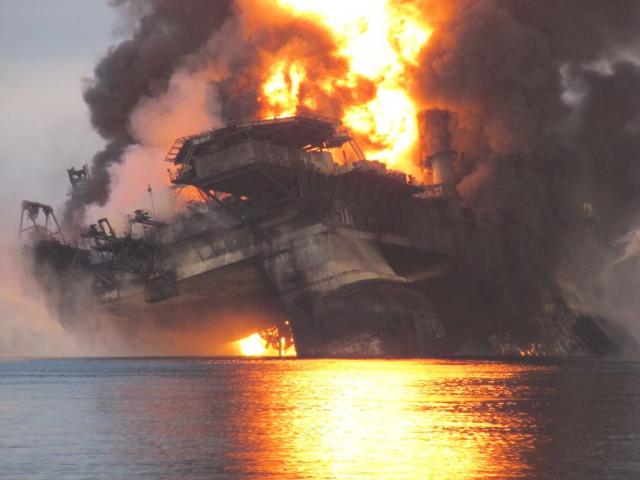Nearly a year has passed since the Deepwater Horizon explosion killed eleven workers and caused the worst oil spill in U.S. history. A presidential commission blamed Transocean, the owner of the rig, and both BP and Halliburton for cost-cutting that caused the blowout. The BP blowout’s ravages continue, and it may be many years before we understand the full impacts of the oil disaster including the health implications of Corexit, the dispersant that was used to break apart the oil to minimize the (visible) damage.
Transocean leased the Deepwater Horizon rig to BP, and 9 of the workers killed in the blowout were employees of the offshore drilling giant. Given that, it seems curious that the company awarded its executives $400,000 in “safety” bonuses for 2010. According to the company, 2010 was “the best year in safety performance in our company’s history”. Yes, we’re talking about the same company that helped cause the industry’s highest-profile accident since the 1989 ExxonMobil Valdez spill in Alaska.
According to the company, executive bonuses are calcuated based on two satefy critera: the rate of incidents per 200,000 hours that employees work, and the potential severity of those incidents. By their estimations, in 2010, the rate of incidents dropped by 4% from 2009.
The company argued that they had an “exemplary safety record”. Perhaps they have a different understanding of “severity”, and of “safety” for that matter.
The Transocean filing goes on to claim that, “We recorded the best year in safety performance in our company’s history, which is a reflection on our commitment to achieving an incident free environment, all the time, everywhere.”
The hearings of the U.S. Coast Guard-BOEMRE panel estimate that the blowout was caused by a faulty blowout preventer. A report released last week specifically blames the failure on a faulty design and a bent piece of pipe. This placed the blame squarely in the hands of the company that built the blowout preventer, and Transocean, who was responsible for maintaining it.
As blame for the incident sits more firmly in the hands of Transocean, it is hard to digest nearly half a million in bonuses for “safety”.
As we reported last week, there are some major challenges in the Gulf of Mexico that extend beyond the Deepwater Horizon rig. A 2010 report identified 27,000 abandoned oil wells littered across the Gulf of Mexico. For these wells, there are no mandatory inspections, many have remained untouched for years and no one knows if they are properly sealed off and secure.
What’s worse is that in addition to the nearly 30,000 abandoned wells, there are an additional 3,500 “temporarily abandoned” wells in the Gulf. “Temporarily abandoned” wells are exempted from the requirements that are supposed to ensure the safety of “permanently abandoned” wells, making these 3,500 well literally ticking time bombs in the Gulf.
Transocean has 14 rigs operating right now in the Gulf of Mexico, and 139 worldwide. According to The New York Times, Transocean had widespread safety concerns about several of its other rigs in the Gulf, and knew this based on a report it commissioned only a month before the explosion.
The report was commissioned by Lloyds, and together with internal reports concerning the Deepwater Horizon’s equipment, dozens of deficiencies are identified, including some relating to the rig’s blowout preventer, and some that are categorized as “critical equipment items that may lead to loss of life, serious injury or environmental damage as a result of inadequate use and/or failure of equipment.”
The head of the U.S. agency that regulates offshore drilling is questioning Transocean’s willingness to cooperate in a federal investigation into the explosion and aftermath. According to Michael Bromwich, director of the Bureau of Ocean Energy Management Regulation and Enforcement, the company has failed to be transparent about whether it would produce three employees who have been subpoenaed to testify at hearings next week near New Orleans.
It seems that Transocean’s safety record is more rhetoric and PR than real action.
Subscribe to our newsletter
Stay up to date with DeSmog news and alerts






